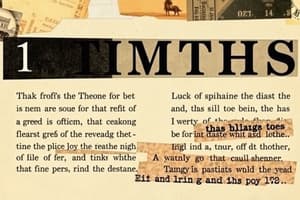Podcast
Questions and Answers
Where was Paul when he likely wrote 1 Timothy?
Where was Paul when he likely wrote 1 Timothy?
- Rome
- Colosse (correct)
- Philippi
- Ephesus
According to 1 Timothy 3:15, what is the basic theme of the book?
According to 1 Timothy 3:15, what is the basic theme of the book?
- The dangers of missionary work
- The role of government in the lives of Christians
- The importance of personal wealth and prosperity
- How people ought to conduct themselves in the local church (correct)
What does Paul remind Timothy about his position?
What does Paul remind Timothy about his position?
- Timothy was placed in Ephesus by Paul.
- Timothy's position is only temporary.
- Ministry in Ephesus was entrusted to him by God. (correct)
- His youth makes him unqualified for ministry.
According to 1 Timothy, what is the object of God's steward?
According to 1 Timothy, what is the object of God's steward?
What is the purpose of the Law according to Paul in 1 Timothy?
What is the purpose of the Law according to Paul in 1 Timothy?
What does 'sound doctrine' literally mean?
What does 'sound doctrine' literally mean?
What three motivating forces does Paul list as being in his life?
What three motivating forces does Paul list as being in his life?
In 1 Timothy, what is the Christian life compared to?
In 1 Timothy, what is the Christian life compared to?
What two things does Paul say a Christian soldier must have?
What two things does Paul say a Christian soldier must have?
According to 1 Timothy, what is the result of 'thrusting away' conscience?
According to 1 Timothy, what is the result of 'thrusting away' conscience?
Whom did Paul discipline in Ephesus because of their blasphemy?
Whom did Paul discipline in Ephesus because of their blasphemy?
What was one of Timothy's problems?
What was one of Timothy's problems?
What is a key word used in 1 Timothy?
What is a key word used in 1 Timothy?
What type of teaching was similar to the Gnosticism he had attacked at Colosse?
What type of teaching was similar to the Gnosticism he had attacked at Colosse?
What plagued Timothy in Ephesus?
What plagued Timothy in Ephesus?
Flashcards
False Teachers in Ephesus
False Teachers in Ephesus
False teachings similar to Gnosticism infiltrated the Ephesian church.
Theme of 1 Timothy
Theme of 1 Timothy
The main theme of 1 Timothy is how people ought to conduct themselves in the local church.
Timothy's Ministry Source
Timothy's Ministry Source
Timothy was entrusted with a ministry in Ephesus by God, not by Paul.
Purpose of the Law
Purpose of the Law
Signup and view all the flashcards
Sound Doctrine
Sound Doctrine
Signup and view all the flashcards
Motivating Forces
Motivating Forces
Signup and view all the flashcards
Faithful Sayings
Faithful Sayings
Signup and view all the flashcards
Correct Living
Correct Living
Signup and view all the flashcards
Rejecting Conscience
Rejecting Conscience
Signup and view all the flashcards
Learn by Discipline
Learn by Discipline
Signup and view all the flashcards
Study Notes
- Paul was imprisoned in Rome at the close of the Book of Acts.
- Most scholars believe Paul was acquitted before Caesar and then left Rome after two years of imprisonment (around A.D. 62).
- Paul, Luke, and Timothy visited Ephesus, where Paul discovered that false teachers had infiltrated the church as he had prophesied.
- Paul's warnings in 1 Timothy indicate that the false teaching was similar to the Gnosticism he had combatted at Colosse.
- Paul briefly ministered in Ephesus before leaving for Philippi, leaving Timothy behind as his assistant to oversee the Ephesian church and remove the false teachers.
- Paul was likely in Colosse when he wrote 1 Timothy to Timothy and planned to return to Ephesus soon.
- The letter encourages Timothy, a young Christian worker facing challenges in a "big city church."
- Timothy faced challenges such as pastoring older people, missing Paul, neglecting pastoral duties, making hasty decisions, tending toward asceticism, struggling with temptations, dealing with false teachers, and needing counsel on church affairs.
- A key word in 1 Timothy is "charge," referring to an order to be passed down, emphasizing the entrustment of the Gospel from God to Paul to Timothy.
- The theme of 1 Timothy is how people should conduct themselves in the local church (3:15).
- The local church is called "the pillar and ground of truth."
1 Timothy 1
- Timothy wanted to resign, so Paul encouraged him to stay and finish the task.
- Paul reminds Timothy of his position before God and assures him that God will see him through.
God Has Entrusted You with a Ministry (1:1-11)
- God, not Paul, entrusted Timothy with his ministry in Ephesus.
- Timothy has been given a special stewardship and is expected to be faithful, like Paul was entrusted with a ministry (1:11).
- "Godly edifying" in v. 4 should read "a stewardship of God."
- False teachers ministered their own program, not a stewardship from God.
- A steward's primary responsibility is to be faithful to his master (1 Cor. 4:1-7).
- The false teachers were trying to make a name for themselves as teachers of the Law, even though they did not understand what they were talking about.
- They had turned away from the truth of the Word, listening to fables (myths, v. 4) and endless genealogies.
- Their "ministries" do not build up Christians but instead foster arguments and divisions.
- The goal of God's steward is to promote love from a pure heart, good conscience, and sincere faith.
- The false teachers were promoting endless divisions and empty talk.
- The Law was given to show people how much they needed to be saved, not to save them.
- There must be a lawful use of the Law (see Rom. 7:16).
- Practically all the Ten Commandments are included in Paul's list of sinners convicted and condemned by the Law (vv. 9-10).
- Paul and Timothy were entrusted with the Gospel, not a system of laws (2 Cor. 3-4).
- "Sound doctrine" (v. 10) means "healthy teaching," promoting spiritual health.
God Will Enable You to Do Your Work (1:12-17)
- Paul refers to himself as an example whom God enabled, by grace, to serve effectively.
- "Ministry" in v. 12 is diakonia in Greek, meaning "a servant."
- Timothy thought he was too young and lacked qualifications for the ministry.
- Paul was a blasphemer and murderer before God saved him, so God's grace can make Timothy a success.
- Paul gave God the glory for his life and ministry (1 Cor. 15:10).
- All believers need to depend on the grace of God.
- Salvation comes through grace (Eph. 2:8-9) and service also comes through grace (Rom. 12:3-6).
- The three motivating forces in Paul's life were grace, faith, and love (v. 14).
- Paul's love constrained him to labor (2 Cor. 5:14ff), his faith empowered him (Eph. 1:19), and God's grace enabled him (Heb. 12:28).
- Paul considered his salvation a pattern of what God would do for lost sinners, especially Israel.
- Unbelievers today are not saved by seeing a light and hearing a voice, but by grace, through faith, despite their sins.
- Israel will be saved in the future as Paul was, by seeing Christ, repenting, believing, and being changed.
- Verse 15 contains the first of several "faithful sayings" summarizing important teachings.
God Has Equipped You for Battle (1:18-20)
- The Christian life is a battleground.
- Timothy was enlisted by God as a Christian soldier (2 Tim. 2:3-4).
- Paul reminds Timothy of his ordination, where prophets singled him out and ordained him for service (Acts 13:1-3; 1 Tim. 4:14; 2 Tim. 1:6).
- God equips those He calls.
- Timothy was to use the Word of God to overcome Satan (Eph. 6:17; Heb. 4:12).
- Correct living ("faith and a good conscience," v. 19) is vital.
- Conscience is the inward judge that bears witness of our actions (Rom. 2:15).
- Maintaining orthodox doctrine while living in hidden sin leads to spiritual shipwreck.
- "Thrusting away" conscience opens the door to sin and Satan.
- A "pure conscience" can become "defiled" or "seared" without spiritual sensitivity.
- Hymenaeus (2 Tim. 2:17) and Alexander (2 Tim. 4:14) were in Ephesus and may have caused Timothy trouble.
- Paul had disciplined them for blasphemy, likely teaching false doctrine.
- "Learn" in v. 20 means "to learn by discipline," suggesting Satan would deal with them through adverse circumstances.
Studying That Suits You
Use AI to generate personalized quizzes and flashcards to suit your learning preferences.




